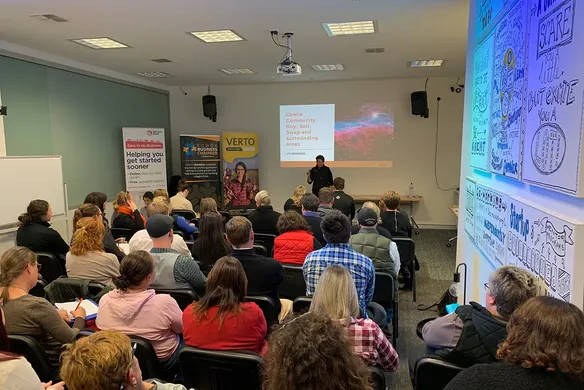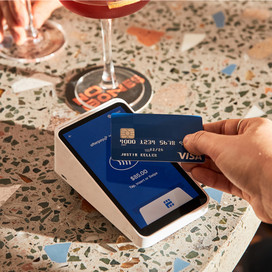Business chambers and trade groups are commonplace in Australia, inhabiting most local towns and shires across the country to help business owners run and grow their operations. While they are set up to offer expert business advice, educational events and advocacy services — and many of them do a bang-up job of this — there are not many out there simultaneously establishing and running co-working spaces and dedicated startup hubs that address their community’s key struggles. In fact, there’s only one that we know of: the Cowra Business Chamber.
Cowra is a regional town in the central west of New South Wales (near Bathurst), with a population of just over 10,000 people. The Cowra Business Chamber has been a stalwart of its community for 80 years (and it’s only getting stronger), now just shy of 200 business members. Jordan Core, a business manager in Cowra, has been running the chamber for the past two years and has recently led them to be the first chamber in Australia to develop a dedicated business hub that is working to address their key regional business struggles.
The Cowra Business Hub opened in March of this year, the result of a Regional Economic Development Strategy that spurred from a local business survey run by the chamber and council to find out what the community’s key concerns were when it came to business. Skills gaps, vocational help for disadvantaged youth and aid for farming businesses were highlighted in the report that the newly formed Hub is now aiming to fix, and they’ve adopted some of the world’s leading tech platforms to help them do it.
We caught up with Jordan to find out a bit more about the town, the initiative and how they’re taking technology to rural businesses.
What were some of the key motivators for starting the Cowra Business Hub?
The Hub was an idea that started in mid-2018. We ran a business survey with the Cowra Regional Council, asking local businesses what their key concerns were for the community. We received pretty consistent feedback that the main concerns were the skills gap and getting employable youth to stick around and take jobs in town to help local businesses grow. So that was something we knew we could address straight away.
We were also very aware that the current drought was hitting a lot of our farming and agricultural businesses quite hard, so we were looking for a way to give them a helping hand by drumming up some more education and awareness around creating side hustles or extra revenue-stream opportunities.
What services do you typically offer?
Although we are seen as a startup hub, we definitely are here to support all types of businesses. We do run programs to train startups and new entrepreneurs on how to get going and run a business, but we also help established businesses take the next step and implement strategies that will help them grow. We do this through programs and courses that teach a range of skills, such as providing top customer service, running effective social media, and employee and sales training.
The space we have fitted out is a functional co-working space with meeting rooms available for anyone to use. We also have the capacity for events — and the chamber runs anywhere up to 40 events per year — so there is quite a lot of activity.
What types of business typically use the Hub?
That’s a tough one to answer, because the industries that make up our business community are so varied. We definitely see a lot of professional services, like graphic designers and app developers, but there are also your more common retail or food and service businesses too. The Hub also offers free access and training to local farm businesses which are really suffering through this drought period.
What type of technology have you adopted to help you run the new Business Hub in conjunction with the chamber’s activities?
I’ve done a lot of shopping around when it comes to tech platforms because I think it’s so important to get them right and make sure you’re using the best possible solution for your business needs. First and foremost, we’re a co-working hub, so we use a platform called Smpl. It is software dedicated to smaller co-working businesses and allows residents to book and pay for desk space, reserve meetings rooms, etc. We also use the messaging app Slack for our members to communicate and keep in touch easily.
When it comes to events, we use Square as a mobile on-the-spot payment tool. Square’s card reader is super handy because our events are often held at different locations around town, so if we get any walk-ins it ensures we get paid on time wherever we are. We also advertise all our events through Eventbrite, which integrates with Facebook, so it’s an easy way for us to get the word out on what’s coming up.
Where would you like to see the Cowra Business Hub in three years?
Well, believe it or not, while we’ve only been open just three months, we’re already bursting at the seams when it comes to space, so I think we will definitely be moving to a bigger space in the next three years. We are also starting to experiment with remote programs and courses via video link. We do live in regional Australia and understand that many of our business members sometimes have to travel great distances to make events, so providing programs and services remotely is a big must for us. Doing this will also allow us to link up with other expert services outside of our community, like hubs in Dubbo and Sydney.
When it comes to the key challenges we are aiming to solve, I think our services will expand — especially on the skills training front. We have a big indigenous population here so we are planning to run some job training for youths who want to be employed and linked with local businesses. We’d also like the Hub to cater to Cowra’s new community members, like refugees and migrants who are resettling in the area. We plan to run courses and job training for these groups too.
Safe to say we will have a busy few years ahead!
Related articles
Bussy McBusface – Meet the Coffee Entrepreneur who Ditched his IT Career
How to Write a Business Plan
How to Manage Your Costs as a Business Owner
![]()











